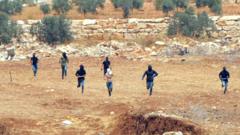The Palestinian Authority (PA) has officially lifted its ban on Al Jazeera in the West Bank after four months of restrictions, reflecting the ongoing tensions over media coverage and the complex political dynamics in the region.
Palestinian Authority Revokes Al Jazeera Ban in West Bank

Palestinian Authority Revokes Al Jazeera Ban in West Bank
The decision comes following accusations of incitement and interference that led to the initial ban.
In a significant development, the Palestinian Authority announced on Monday that it would rescind the ban it imposed on Al Jazeera in January, a decision initially made due to allegations of the broadcaster “inciting sedition” and meddling in internal Palestinian affairs. The indefinite ban was articulated by PA’s attorney general, Akram Khatib, but specifics regarding the claims against Al Jazeera have remained vague.
Khatib confirmed that a court would formalize the lifting of the ban on Tuesday, yet did not elaborate on any changes that might have influenced this decision. The PA, predominantly led by the Fatah party, has historically been at odds with the Qatari-funded network, often accusing it of being sympathetic to Hamas, a rival faction that expelled Fatah from Gaza in 2007.
The timing of the ban coincided with a high-stakes operation in Jenin, targeting militants affiliated with groups like Hamas and Islamic Jihad. Critics, including Palestinian activists and human rights organizations, have accused the PA of stifling dissent and intimidating media voices. In response to the ban's implementation, Al Jazeera asserted that the Palestinian leadership sought to suppress the realities occurring within the occupied territories.
The backdrop of this ban aligns with wider regional tensions, as Israeli authorities had previously imposed restrictions on Al Jazeera. In May, Israel ordered the broadcaster’s shutdown and later conducted a raid on its Ramallah office. Al Jazeera has positioned itself as a critical voice amid the ongoing Israeli-Palestinian conflict, particularly during escalations such as the recent war in Gaza, where it has reported extensively on civilian conditions, often accused by Israel of bias and alleged connections to Hamas.
Following the PA's lifted ban, Walid al-Omari, Al Jazeera's bureau chief in Ramallah, indicated that while the offices would not be reopened immediately due to Israeli restrictions, the journalists could operate without fear of PA retaliation, marking a complex moment in the intersecting narratives of media, governance, and conflict in the West Bank.
Khatib confirmed that a court would formalize the lifting of the ban on Tuesday, yet did not elaborate on any changes that might have influenced this decision. The PA, predominantly led by the Fatah party, has historically been at odds with the Qatari-funded network, often accusing it of being sympathetic to Hamas, a rival faction that expelled Fatah from Gaza in 2007.
The timing of the ban coincided with a high-stakes operation in Jenin, targeting militants affiliated with groups like Hamas and Islamic Jihad. Critics, including Palestinian activists and human rights organizations, have accused the PA of stifling dissent and intimidating media voices. In response to the ban's implementation, Al Jazeera asserted that the Palestinian leadership sought to suppress the realities occurring within the occupied territories.
The backdrop of this ban aligns with wider regional tensions, as Israeli authorities had previously imposed restrictions on Al Jazeera. In May, Israel ordered the broadcaster’s shutdown and later conducted a raid on its Ramallah office. Al Jazeera has positioned itself as a critical voice amid the ongoing Israeli-Palestinian conflict, particularly during escalations such as the recent war in Gaza, where it has reported extensively on civilian conditions, often accused by Israel of bias and alleged connections to Hamas.
Following the PA's lifted ban, Walid al-Omari, Al Jazeera's bureau chief in Ramallah, indicated that while the offices would not be reopened immediately due to Israeli restrictions, the journalists could operate without fear of PA retaliation, marking a complex moment in the intersecting narratives of media, governance, and conflict in the West Bank.




















